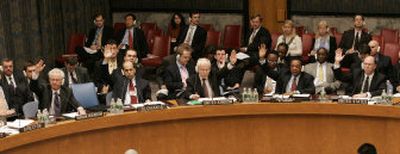U.N. votes to sanction Iran

WASHINGTON – The U.N. Security Council voted unanimously Saturday to impose sanctions on Iran aimed at slowing its nuclear program.
The sanctions, intended to force Iran to cease enriching uranium, stopped short of allowing the United States to take military action to enforce them, however.
“We do not wish to see new turbulence in the Middle East,” said Wang Guangya, China’s U.N. ambassador. Envoys from Russia, France and Argentina made similar comments.
American officials, who’ve accused Iran of using its civilian nuclear program to try to develop nuclear weapons, hailed the resolution’s passage. Other analysts said the unanimous vote was a triumph for the United States, though the final resolution was weaker than what the United States and its allies originally had sought.
“We hope this resolution will convince Iran that the best way to ensure its security and end its international isolation is to abandon its pursuit of nuclear weapons,” Alejandro Wolff, U.S. acting ambassador to the United Nations, said during debate on the measure.
Gary Sick, a former Iran advisor to Presidents Carter, Ford and Reagan who now heads Columbia University’s Middle East Institute, called the vote “a blow to Iran.”
“They will be very angry (in Tehran), but they will also understand that this was a real demonstration that there can be a united front against their program,” Sick said.
In Tehran, the Iranian Foreign Ministry said in a statement that the U.N. resolution “will not be an obstacle in the way of Iran’s nuclear progress.”
Calling the measure “invalid” and “illegal,” the ministry said Iran would continue to enrich uranium at its nuclear facility in Natanz. Uranium enrichment is necessary to increase its potency and can be used to produce both fuel for a nuclear reactor and material for an atomic bomb.
The U.N. measure prohibits Iran from importing “proliferation sensitive” materials to make nuclear weapons or ballistic missiles. It freezes the foreign assets of 12 named Iranian individuals and 11 Iranian firms believed to be tied to Iran’s nuclear program, while barring the individuals’ travel abroad. An earlier draft sought to broaden the travel ban to include all Iranian officials.
The Security Council resolution requires the International Atomic Energy Agency (IAEA), the U.N. nuclear watchdog, to report within 60 days on Iranian compliance.
Just hours before the vote, President Bush and Russian President Vladimir Putin spoke by phone to seal an accord reached after two months of negotiations.
The United States, Britain, France and Germany made 11th-hour concessions that narrowed the scope of the Security Council resolution to overcome concerns by Russia and China, which have close economic ties with Iran.
“Russia views this resolution as a serious message being sent to Iran regarding the need to more actively and more openly cooperate … to lift concerns related to its nuclear program,” Vitaly Churkin, Russian ambassador to the United Nations, said at the Security Council session.
Noting that the measure allows Moscow and Tehran to continue a broad range of trade in other areas, Churkin added: “We firmly believe that cooperation with Iran in areas not affected by the resolution is not restricted.”
Russia is helping Tehran build a nuclear power reactor in Bushehr in southern Iran. As part of the arduous talks that led to the diplomatic deal, a prohibition on the delivery of fuel to the plant was dropped from the resolution.
Nicholas Burns, U.S. undersecretary of state, told reporters that the Bush administration would seek to persuade other countries to impose more sweeping economic sanctions of the sort the United States has imposed since 1979.
Despite voting for the resolution against Iran, envoys from Qatar, Japan, Tanzania, and Argentina emphasized the right of signatory nations to the Non-Proliferation Treaty to develop nuclear power for civilian use.
Iran is not a member of the Security Council, but its U.N. representative was permitted to sit at the end of the council’s crescent-shaped table for the debate. He bitterly criticized the measure after the vote and called allegations that Iran was trying to develop nuclear weapons “unfounded” and “self-serving.”
The envoy, Javad Zaril, repeated Iranian assertions that its nuclear program is intended only to produce power for civilian use and that Iran has complied with international norms by permitting IAEA inspectors to visit its facilities.